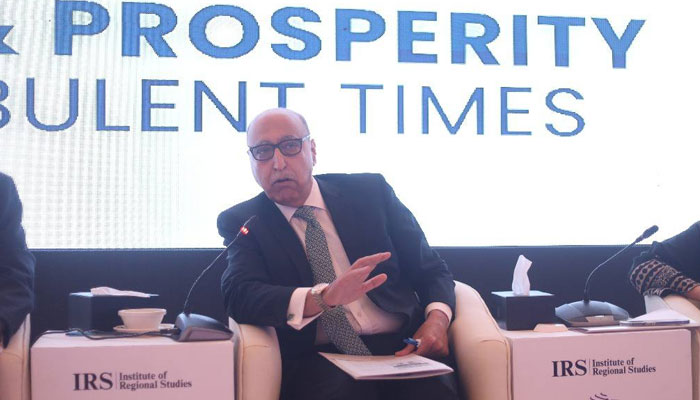‘War may not be limited when 2 nuclear powers at loggerheads’
Islamabad:Abdul Basit, former High Commissioner to India, has emphasised that regional connectivity cannot be realised unless conflicting bilateral issues, especially those with India, are addressed.
Mr Basit was speaking at “Regional Dialogue 2025” hosted here by Institute of Regional Studies (IRS), Mr Basit called for a thorough and honest analysis of Indian strategic thinking to help create realistic and forward-looking policy responses. Highlighting the Kashmir dispute, he warned that the issue is becoming increasingly complex and continues to threaten regional peace and stability.
Former Defence Minister Khurram Dastgir warned about potential escalation at a time when two nuclear powers engaged in a military conflict following the tragic event of Pahalgam. War may not be limited when two nuclear powers are at loggerheads, he opined.
journalist Arifa Noor noted that Pakistan’s approach towards India had often been tactical rather than strategic. She argued that India’s anti-Pakistan rhetoric is rooted in broader anti-Muslim narratives. She also criticised Pakistan’s media for failing to create space for active foreign policy debates and for not engaging Indian critics of the Modi govt, which weakens Pakistan's counter-narrative.
Javed Jabbar, a former Information Minister, emphasised the role of the Indian military in shaping New Delhi’s foreign policy. He warned that “no diplomatic overture or troop movement occurs without military approval.” Defending Track-II diplomacy, he stated that it is not a betrayal, it is a patriotic platform where dedicated nationalists engage to prevent conflict and preserve dialogue. However, he also asserted that the virus of Hindutva infected the Indian psyche, and even if the Congress Party were to win, he believed there would not be much change. Hamid Mir, senior anchor-person, rejected the approach of Track-II diplomacy with India calling it a deceptive strategy. He argued that Pakistan's survival, rather than just the issue of Kashmir, is central to India's long-term strategic posture which he linked to the ideological pursuit of Akhand Bharat.
-
 Kim Kardashian And Lewis Hamilton Make First Public Appearance As A Couple At Super Bowl 2026
Kim Kardashian And Lewis Hamilton Make First Public Appearance As A Couple At Super Bowl 2026 -
 Romeo And Cruz Beckham Subtly Roast Brooklyn With New Family Tattoos
Romeo And Cruz Beckham Subtly Roast Brooklyn With New Family Tattoos -
 Meghan Markle Called Out For Unturthful Comment About Queen Curtsy
Meghan Markle Called Out For Unturthful Comment About Queen Curtsy -
 Bad Bunny Headlines Super Bowl With Hits, Dancers And Celebrity Guests
Bad Bunny Headlines Super Bowl With Hits, Dancers And Celebrity Guests -
 Insiders Weigh In On Kim Kardashian And Lewis Hamilton's Relationship
Insiders Weigh In On Kim Kardashian And Lewis Hamilton's Relationship -
 Prince William, Kate Middleton Private Time At Posh French Location Laid Bare
Prince William, Kate Middleton Private Time At Posh French Location Laid Bare -
 Stefon Diggs Family Explained: How Many Children The Patriots Star Has And With Whom
Stefon Diggs Family Explained: How Many Children The Patriots Star Has And With Whom -
 ‘Narcissist’ Andrew Still Feels ‘invincible’ After Exile
‘Narcissist’ Andrew Still Feels ‘invincible’ After Exile -
 Shamed Andrew ‘mental State’ Under Scrutiny Amid Difficult Time
Shamed Andrew ‘mental State’ Under Scrutiny Amid Difficult Time -
 Bad Bunny's Super Bowl Halftime Show: What Time Will He Perform Tonight?
Bad Bunny's Super Bowl Halftime Show: What Time Will He Perform Tonight? -
 Where Is Super Bowl 2026 Taking Place? Everything To Know About The NFL Showdown
Where Is Super Bowl 2026 Taking Place? Everything To Know About The NFL Showdown -
 Chris Pratt Explains Why He And Katherine Schwarzenegger Did Premarital Counseling
Chris Pratt Explains Why He And Katherine Schwarzenegger Did Premarital Counseling -
 Drake 'turns Down' Chance To Hit Back At Kendrick Lamar At Super Bowl
Drake 'turns Down' Chance To Hit Back At Kendrick Lamar At Super Bowl -
 Sarah Ferguson Had A ‘psychosexual Network’ With Jeffrey Epstein
Sarah Ferguson Had A ‘psychosexual Network’ With Jeffrey Epstein -
 Miranda Kerr Shares The One Wellness Practice She Does With Her Kids
Miranda Kerr Shares The One Wellness Practice She Does With Her Kids -
 Czech Republic Supports Social Media Ban For Under-15
Czech Republic Supports Social Media Ban For Under-15




